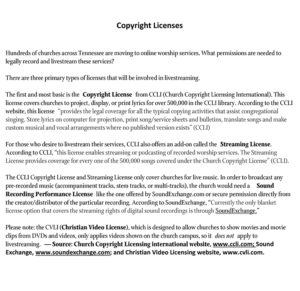By Lonnie Wilkey
[email protected]
 FRANKLIN — As more and more churches begin livestreaming their services due to the coronavirus pandemic, it is imperative that they do it properly and legally, according to Scott Shepherd of the Tennessee Baptist Mission Board.
FRANKLIN — As more and more churches begin livestreaming their services due to the coronavirus pandemic, it is imperative that they do it properly and legally, according to Scott Shepherd of the Tennessee Baptist Mission Board.
“The issue is not whether churches will be caught or prosecuted,” observed Shepherd, TBMB worship and music specialist and a former minister of worship at First Baptist Church, Paris.
“The issue is being a good citizen by obeying our nation’s laws. Plus, as followers of Jesus Christ, we ought to ensure that the artists and publishers of the songs used in our worship gatherings are compensated fairly.”
Shepherd observed that if a hymn was published before 1925, it is in the “public domain,” so it be can be used without any permissions whatsoever. For newer copyrighted hymns and worship songs, however, there are three primary licenses that churches can purchase that will enable them to legally record and livestream their services. See “Copyright Licenses” information box.
The first and most basic is the “copyright license” which allows churches to project, display or print lyrics for over 500,000 selections in the Church Copyright Licensing International (CCLI) library, Shepherd noted. For churches that livestream their services, they would also need to purchase a “livestreaming license,” he added.
Shepherd said the licenses are affordable for any church because they are based on size. For example, he said, a church between 25 and 99 members can purchase both the copyright and livestreaming licenses for $199 (current prices) for one year. The cost would be more for larger churches, he said.
 Shepherd pointed out that the two licenses from CCLI cover only live music. It does not cover any purchased,pre-recorded music, including accompaniment tracks and stem tracks. Special “mechanical licenses” need to be secured through the publisher, or a blanket “sound recording performance license” would need to be purchased through a company like SoundExchange.com, he said. (Update: during the Covid-19 pandemic, some publishing companies—including Lifeway, MultiTracks and others—are allowing churches to use their purchased audio tracks in streaming.)
Shepherd pointed out that the two licenses from CCLI cover only live music. It does not cover any purchased,pre-recorded music, including accompaniment tracks and stem tracks. Special “mechanical licenses” need to be secured through the publisher, or a blanket “sound recording performance license” would need to be purchased through a company like SoundExchange.com, he said. (Update: during the Covid-19 pandemic, some publishing companies—including Lifeway, MultiTracks and others—are allowing churches to use their purchased audio tracks in streaming.)
The TBMB specialist noted that some churches also buy a “Christian video license” if they play movie clips. That license only applies to movie clips shown on the church campus and can’t be used for livestreaming unless the video company has specifically provided those rights, he said
The licenses are affordable for any size church and are imperative, Shepherd observed. “Our churches should be the standard bearers for lawful and ethical livestreaming in our churches.”
And, even when the crisis is over, churches may want to continue livestreaming their services for members who can’t come to church due to health reasons. “Livestreaming services also is a good ministry outreach tool,” he added.
For more information about livestreaming, contact Shepherd at [email protected]. B&R.

